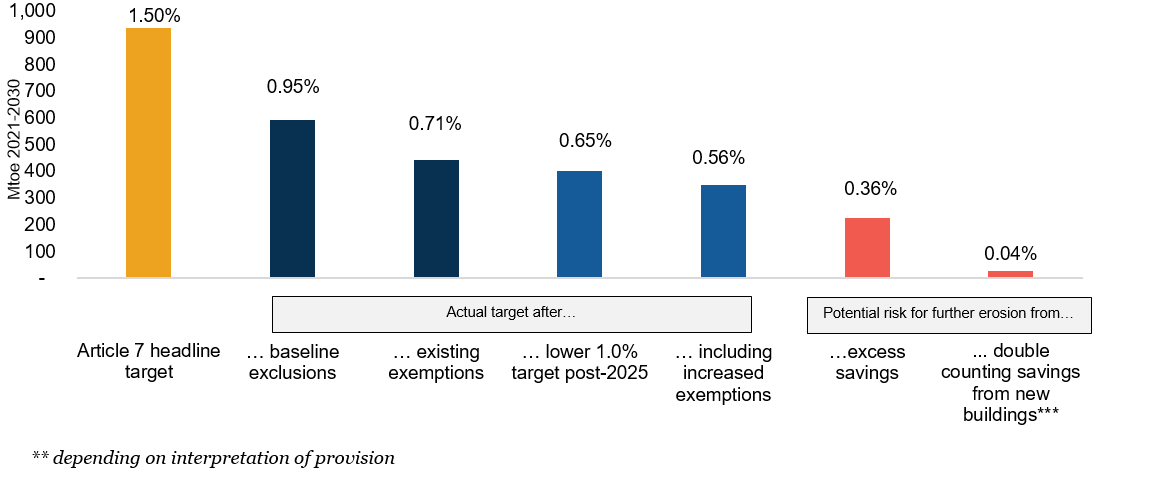Energy efficiency is key to achieving the ambitious carbon reduction goals set out in the Paris Agreement. The International Energy Agency (IEA) created a model scenario, aligned with the Agreement, which indicates that half of global emission reductions will be achieved through energy efficiency measures. This is consistent with work by the Intergovernmental Panel on Climate Change (IPCC) and others.
With these objectives and the multiple societal benefits delivered by energy efficiency in mind, the European Commission adopted the principle of “Efficiency First” in its Winter Package of legislation. The Energy Efficiency Directive (EED) is a key part of the package, designed to deliver energy savings of 30 percent by 2030. Article 7 of the EED outlines requirements for energy efficiency obligations that would deliver about half of the Directive’s entire savings and is a key driver of energy efficiency in Europe.
However, discussions of the Commission proposals in the European Council have attempted to water down Article 7 substantially. In June 2017, RAP published its impact analysis of the amendments to Article 7 proposed by Malta, which then held the rotating EU presidency. We calculated that, if accepted, these proposals would reduce the Article’s current scope of ambition for energy efficiency by more than 80 percent—and perhaps by as much as 100 percent—depending on the amount of additional savings, beyond the required target, reported for the period from 2014 to 2020 and how Member States apply these proposed terms.
Many loopholes remain and new ones have been added
The final outcome of the Council negotiations struck down some of the proposed loopholes, but adopted others:
- The headline target was reduced from 1.5 percent annual savings to just 1.0 percent after 2025, unless the European Commission’s assessment results in recommendation of an increased target.
- The proposal allows for four exemptions that may be applied in the obligation period from 2021 to 2030. The limit of the combined exemptions has been raised from 25 to 35 percent.
- Excess savings from the current Article 7 period from 2014 to 2020 may be applied to lower the minimum savings for the period from 2021 to 2030.
- Energy savings from new buildings standards and codes may potentially be double counted.
- Additionality provisions have been weakened, resulting in looser interpretation of the requirements for energy savings counting toward the Article 7 target. Previous analysis identified that the lack of specific requirements led to an inconsistent and potentially less sound approach.
- The target for small insular states was lowered to just 0.8 percent of annual energy sales for the period from 2021 to 2030.
Proposals put Europe in reverse gear on energy efficiency
RAP carried out a detailed analysis of the final Council position on Article 7. Our analysis shows that the 1.5 percent target will still be reduced by well over half and, in the worst-case scenario, it could plummet to just 0.04 percent. Overall, the proposed loopholes will reduce the current ambition levels in the Commission proposal from 0.71 percent annual savings from efficiency (after exclusions and exemptions), to less than 0.56 percent, at the very least. This represents a 21 percent reduction in ambition.
Impact of Council Proposal

There is considerable uncertainty surrounding the amount of excess savings and the extent to which savings from new buildings may be fully counted (the Council text is ambiguous). In the worst-case scenario—if high excess savings from 2014 and 2015 continue over the entire period from 2014 to 2020, and all savings from new buildings are fully counted—this could in effect reduce the annual savings target to just 0.04 percent.
In the most optimistic scenario, excess savings would be minimal and few Member States would use the option of counting savings from new buildings. At this stage, it is not possible to assess with any certainty the actual savings based on the Council’s proposal. It is clear, however, that there is a risk that the energy savings goals of the EED will be significantly watered down if excess savings are uncapped and if savings from new buildings may count fully toward the target.
European Parliament needs to fix Article 7
The first half of 2017 has been used to weaken the proposals made in the Winter Package. The second half of the year offers a chance to rectify this. Negotiations in the European Parliament are already under way and the European Parliament is now in a position to not only mitigate the potential damage, but to draft robust amendments for Article 7 that will help deliver the 40 percent improvement in energy efficiency that the European Parliament voted for in 2016. If Europe is serious about the Paris Agreement, it needs to get its act together on energy efficiency. Actions speak louder than words.
A version of this blog was originally published by EnergyPost.

